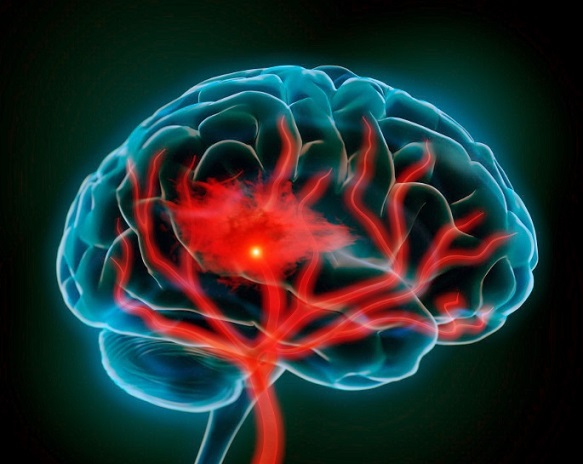New Study Uncovers How Infections Like COVID-19 Trigger Brain Blood Vessel Damage
Nikhil Prasad Fact checked by:Thailand Medical News Team Jun 11, 2025 8 months, 2 days, 16 hours, 47 minutes ago
Thailand Medical News: Infections Can Cause Damage to Tiny Blood Vessels in the Brain
A new scientific review is shedding light on a disturbing connection between common infections like COVID-19 and a hidden but dangerous brain condition called cerebral small vessel disease, or CSVD. This condition affects the smallest blood vessels in the brain, including arterioles and capillaries, and is linked to serious health issues such as stroke, dementia, problems with movement, mood changes, and urinary difficulties. Though CSVD has long been associated with aging, high blood pressure, and diabetes, researchers are now finding that infectious diseases may also be a major trigger.
 New Study Uncovers How Infections Like COVID-19 Trigger Brain Blood Vessel Damage
New Study Uncovers How Infections Like COVID-19 Trigger Brain Blood Vessel Damage
This
Thailand Medical News report is based on a new study published by scientists from Shengjing Hospital of China Medical University and the university’s Department of Developmental Cell Biology. Their work dives deep into how infections, particularly COVID-19, damage the delicate brain vessels and worsen inflammation, contributing to the development or progression of CSVD.
COVID-19 Found to Play a Direct Role in Brain Blood Vessel Disease
The SARS-CoV-2 virus, which causes COVID-19, has been shown to enter the brain through various routes—including the bloodstream and infected immune cells—and to cause direct injury to the blood-brain barrier (BBB), a vital protective shield between the brain and harmful substances. COVID-19 spike proteins bind to ACE2 receptors found on brain vessel walls, allowing the virus to damage endothelial cells that make up the vessel lining. This results in inflammation, immune overreaction, and what researchers call microvascular “immunothrombosis”—tiny clots and vessel blockages that are hallmarks of CSVD.
Importantly, the spike protein can cross the BBB and trigger brain endothelial cell dysfunction, especially when assisted by cellular enzymes like furin. Experiments on mice and cell cultures show that exposure to the spike protein alone is enough to damage brain vessel cells and raise levels of inflammatory molecules like C5b-9, which are involved in blood vessel inflammation and breakdown.
Inflammation and Immune Overdrive Link COVID-19 to Long-Term Brain Injury
A significant mechanism through which COVID-19 causes CSVD involves inflammation. Infected individuals often show elevated levels of interleukin-6 (IL-6), D-dimer, and soluble CD40 ligand (sCD40L), all of which are markers of immune system overactivation. These biomarkers are also found in patients with CSVD. sCD40L, released by platelets, plays a role in promoting blood clotting and inflammation in the blood vessels. This leads to long-term vascular damage and breakdown of the blood-brain barrier.
Another protein involved is sTREM-2, which signals immune cells in the brain called microglia. High levels of sTREM-2 are seen in patients with COVID-19 and have been linked to white matter injury and CSVD,
making it a potential biomarker for future diagnosis and monitoring.
Oxidative Stress and Viral Proteins Further Harm Brain Function
COVID-19 also causes a surge in oxidative stress, where damaging molecules called reactive oxygen species (ROS) overwhelm the body’s defenses. These molecules damage the brain’s small vessels, contribute to inflammation, and impair blood flow. Researchers point to specific enzymes like NOX1, NOX2, and NOX4 as the culprits generating these damaging substances in the brain.
On top of that, SARS-CoV-2 produces a protein called 3CLpro that can cleave another critical molecule in the immune pathway called NEMO. When this occurs, it interferes with the brain’s ability to regulate immune responses and repair blood vessels, further escalating the risk of microvascular damage.
Disruption of Neurovascular Coupling and Role of Microparticles
Neurovascular coupling—the system that matches brain activity with blood flow—is also disrupted by COVID-19. When this system fails, parts of the brain don’t receive enough oxygen and nutrients, which is especially dangerous for elderly individuals or those with pre-existing conditions. Inflammation and oxidative stress caused by COVID-19 interfere with this balance, worsening the potential for CSVD.
The virus also promotes the formation of microparticles (MPs), tiny vesicles released from cells during infection or injury. These MPs carry pro-inflammatory and clot-promoting signals that damage blood vessels and further contribute to CSVD. MPs carrying the ACE2 receptor may even travel from the lungs to the brain, acting as dangerous emboli that lodge in cerebral vessels.
Conclusion
This comprehensive review highlights that COVID-19 and other infections may not just be short-term illnesses but long-term threats to brain health. By damaging the blood-brain barrier, promoting inflammation, releasing toxic viral proteins, and generating clot-promoting microparticles, these infections could significantly contribute to the development of cerebral small vessel disease. As the global population continues to grapple with long COVID and the lingering effects of other infections, understanding these hidden mechanisms becomes crucial. The study urges further research to explore treatments targeting inflammation, oxidative stress, and vascular health, particularly in individuals experiencing long-term neurological symptoms after infection.
The study findings were published in the peer reviewed journal: Frontiers in Immunology
https://www.frontiersin.org/journals/immunology/articles/10.3389/fimmu.2025.1594891/full
For the latest COVID-19 News, keep on logging to
Thailand Medical News.
Read Also:
https://www.thailandmedical.news/news/covid-19-causes-reversible-cerebral-vasoconstriction-syndrome-that-lasts-for-months
https://www.thailandmedical.news/news/cerebromicrovascular-health-and-long-covid
https://www.thailandmedical.news/news/one-third-of-all-exposed-to-covid-19-likely-to-develop-cerebral-microbleeds
https://www.thailandmedical.news/articles/coronavirus
https://www.thailandmedical.news/pages/thailand_doctors_listings
